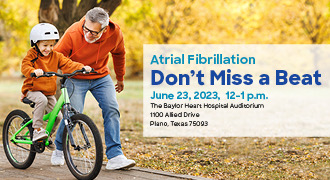
Course Description
Atrial Fibrillation (AFib) can happen to anyone. Many people who have AFib are not getting the treatment they need.
A racing, pounding heartbeat that happens for no apparent reason should not be ignored, especially when other symptoms are also present, like shortness of breath with light physical activity or lightheadedness, dizziness, or unusual fatigue. AFib is an irregular heartbeat or a condition in which the heart muscles fail to contract in a strong, rhythmic way. When a heart is in AFib, it may not be pumping enough oxygen-rich blood out to the body.
Why is AFib associated with a five-times-greater risk for stroke? When the heart is in AFib, the blood can become static and can be left pooling inside the heart. When blood pools, a clot can form. When a clot is pumped out of the heart, it can get lodged in the arteries which may cause a stroke. Blocked arteries prevent the tissue on the other side from getting oxygen-rich blood, and without oxygen the tissue dies.
Any person who has AFib needs to evaluate stroke risks and determine with a healthcare provider what must be done to lower the risks. Studies show that many people with AFib who need risk-lowering treatments are not getting them. – American Heart Association
Scientific Program
Agenda | Thursday, September 29, 2022
Faculty
Brian Deville, MD
J. Brian DeVille, MD, FACC, FHRS is board certified by the American Board of Internal Medicine in cardiovascular disease and clinical cardiac electrophysiology. Dr. DeVille is the founder of Arrhythmia Management and has been specializing in the treatment of cardiac rhythm disorders for over 20 years. His professional interests include catheter ablation, pacemaker and ICD implantation and management, lead extraction, and clinical research in the areas of ablation and device management. Dr. DeVille is the co-medical director of Electrophysiology for Baylor Health Care System. He is very active in research and frequently presents and instructs on the advanced treatment options available in his field.
Leon Rosenthal, MD
Leon Rosenthal is a physician providing patient care in the diagnosis and treatment of sleep disorders. He is certified by the American Board of Psychiatry and Neurology. Being a native Spanish speaker he graduated from the Ciudad Universitaria, Mexico City, the main campus of the National Autonomous University of Mexico. He completed post-graduate training at the University of Texas Southwestern Medical School in Dallas, TX and at the Henry Ford Hospital in Detroit, MI. Dr. Rosenthal is a clinician scientist who has served as the principal investigator in multiple interdisciplinary research projects. His publications span the field of Sleep Medicine with 131 abstracts presented at national & international meetings, 80 published papers and 22 chapters. Dr. Rosenthal remains active in the major sleep medicine societies and provides expert professional advice in matters related to the diagnosis and treatment of sleep disorders.